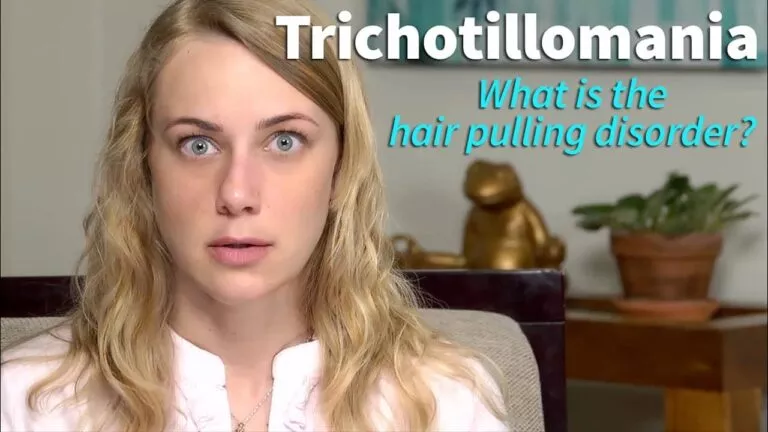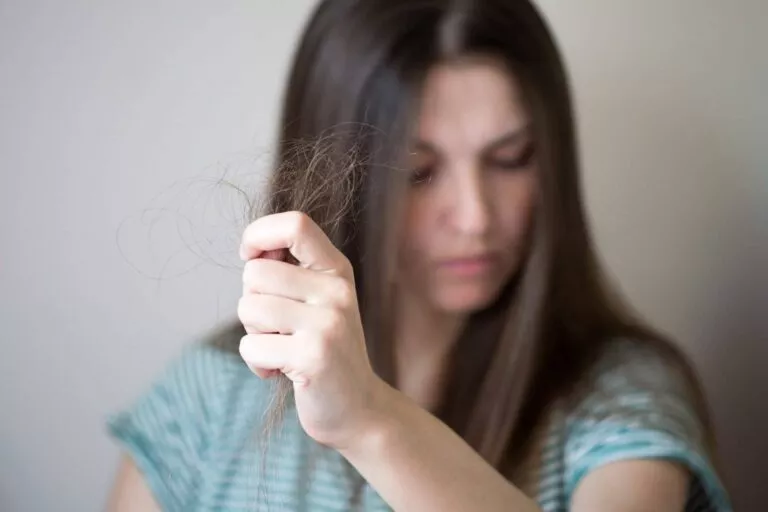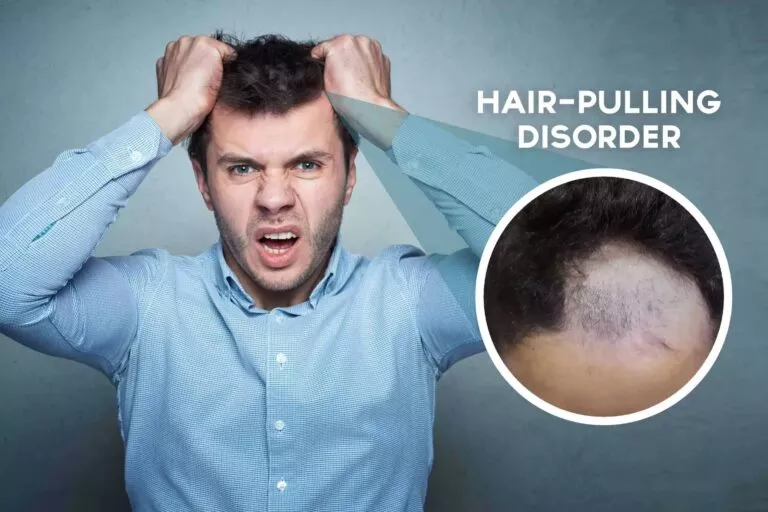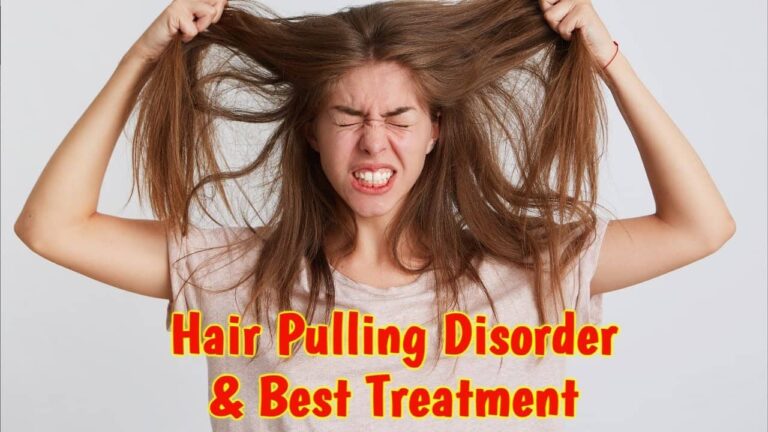TRICHOTILLOMANIA – SYMPTOMS, CAUSES, AND TREATMENT
Trichotillomania, also known as a hair-pulling disorder, is a mental disorder that involves recurrent, irresistible urges to pull out hair from your scalp, eyebrows, or other areas of your body, despite trying to stop.
Hair pulling from the scalp usually leaves patchy bald spots, which cause significant distress and could interfere with social or work functioning. People with trichotillomania might go to great lengths to disguise the loss of hair.
For some people, trichotillomania might be mild and usually manageable. For others, the compulsive urge to pull their hair is overwhelming. Some treatment options have helped many people lessen their hair pulling or stop completely.

SYMPTOMS
Signs and symptoms of trichotillomania usually include:
- Repeatedly pulling your hair out, generally from your scalp, eyebrows, or eyelashes, but sometimes from other body areas, and sites might vary over time
- An increasing sense of tension prior to pulling, or when you try to resist pulling
- A sensation of pleasure or relief after the hair is pulled
- Noticeable hair loss, like shortened hair or thinned or bald areas on the scalp or other areas of your body, including sparse or missing eyelashes or eyebrows
- Preference for certain types of hair, rituals that accompany hair pulling, or patterns of hair pulling
- Biting, chewing, or eating pulled-out hair
- Playing with pulled-out hair or rubbing it through your lips or face
- Repeatedly trying to stop pulling out your hair or trying to do it less frequently without success
- Significant distress or problems at work, school, or in social situations associated with pulling out your hair
Many people who suffer from trichotillomania also pick their skin, bite their nails or chew their lips. Sometimes pulling hairs from pets or dolls or from materials, like clothes or blankets, might be a sign. Most people with trichotillomania pull hair in private and usually try to hide the disorder from others.
For people with trichotillomania, hair pulling could be:
- Focused – Some people pull their hair intentionally to relieve tension or distress — for instance, pulling hair out to get relief from the overwhelming urge to pull hair. Some people might develop elaborate rituals for pulling hair, like finding just the right hair or biting pulled hairs.
- Automatic – Some people pull their hair without even realizing they are doing it, like when they are bored, reading, or watching TV.
The same person might do both focused and automatic hair pulling, depending on the situation and mood. Certain positions or rituals might trigger hair pulling, like resting your head on your hand or brushing your hair.

Trichotillomania could be related to emotions:
- Negative emotions – For many people with trichotillomania, hair pulling is a way of dealing with negative or uncomfortable feelings, like stress, anxiety, tension, boredom, loneliness, fatigue, or frustration.
- Positive feelings – People with trichotillomania usually find that pulling out hair feels satisfying and provides a measure of relief. Consequently, they continue to pull their hair to maintain these positive feelings.
Trichotillomania is a lifelong (chronic) disorder. Without treatment, symptoms could vary in severity over time. For example, the hormonal changes of menstruation could worsen symptoms in women. For some people, if not treated, symptoms could come and go for weeks, months, or years at a time. Rarely, the hair pulling ends within a few years of starting.
WHEN SHOULD YOU SEE A DOCTOR?
If you cannot stop pulling out your hair or you feel embarrassed or ashamed by your appearance as a result of your hair pulling, talk to your doctor. Trichotillomania is not just a bad habit, it is a mental health disorder, and it is unlikely to get better without treatment.
CAUSES
The cause of trichotillomania is not clear. But like many complex disorders, trichotillomania likely results from a combination of genetic and environmental factors.
RISK FACTORS
These factors usually increase the risk of trichotillomania:
- Family history – Genetics might play a role in the development of trichotillomania, and the disorder might happen in those who have a close relative with the disorder.
- Age – Trichotillomania generally develops just before or during the early teens — most often between the ages of 10 and 13 years — and it is often a lifelong problem. Infants also could be prone to hair pulling, but this is usually mild and goes away on its own without treatment.
- Other disorders – People who have trichotillomania might also have other disorders, like depression, anxiety, or obsessive-compulsive disorder (OCD).
- Stress – Severely stressful situations or events might trigger trichotillomania in some people.
Although far more women than men are treated for trichotillomania, this might be because women are more likely to seek medical advice. In early childhood, boys and girls seem to be equally affected.

COMPLICATIONS
Although it might not seem particularly severe, trichotillomania could have a major negative impact on your life. Complications might include:
- Emotional distress – Many people suffering from trichotillomania report feeling shame, humiliation, and embarrassment. They might experience low self-esteem, depression, anxiety, and alcohol or street drug use because of their condition.
- Problems with social and work functioning – Embarrassment because of hair loss might lead you to avoid social activities and job opportunities. People with trichotillomania might wear wigs, style their hair to disguise bald patches, or wear false eyelashes. Some people might avoid intimacy for fear that their condition will be discovered.
- Skin and hair damage – Constant hair pulling could cause scarring and other damage, including infections, to the skin on your scalp or the specific area where hair is pulled and could permanently affect hair growth.
- Hairballs – Eating your hair might lead to a large, matted hairball (trichobezoar) in your digestive tract. Over a period of years, the hairball could cause weight loss, vomiting, intestinal obstruction, and even death.
DIAGNOSIS
An evaluation to determine if you have trichotillomania might include:
- Examining how much hair loss you have
- Asking questions and discussing your hair loss issues with you
- Removing other possible causes of hair pulling or hair loss through testing determined by your doctor
- Identifying any physical or mental health problems that might be related to hair pulling
- Using the diagnostic criteria in the Diagnostic and Statistical Manual of Mental Disorders (DSM-5), published by the American Psychiatric Association (APA)
TREATMENT
Research on the treatment of trichotillomania is limited. However, some treatment options have helped many people lessen their hair pulling or stop completely.

Therapy
Types of therapy that might be helpful for trichotillomania include:
- Habit reversal training – This behavior therapy is the main treatment for trichotillomania. You learn how to recognize situations where you are likely to pull your hair and how to substitute other behaviors instead. For example, you may clench your fists to help stop the urge or redirect your hand from your hair to your ear. Other therapies might be used along with habit reversal training.
- Cognitive therapy – This therapy could help you identify and examine distorted beliefs you might have in relation to hair pulling.
Therapies that help with other mental health disorders often related to trichotillomania, like depression, anxiety, or substance abuse, could be an important part of treatment.
Medications
Although no medications are approved by the Food and Drug Administration specifically for the treatment of trichotillomania, some medications might help control specific symptoms.
For example, your doctor might recommend an antidepressant, like clomipramine (Anafranil). Other medications that research suggests might have some benefit include N-acetylcysteine, an amino acid that influences neurotransmitters associated with mood, and olanzapine (Zyprexa), an atypical antipsychotic.
Speak with your doctor about any medication that he or she suggests. The possible benefits of medications must always be balanced against possible side effects.
If you or anyone you know is suffering from trichotillomania, our expert providers at Specialty Care Clinics will take care of your health and help you recover.
Call us on (469) 545-9983 to book an appointment with our specialists.
